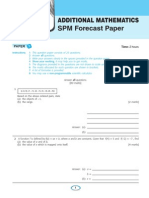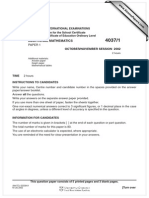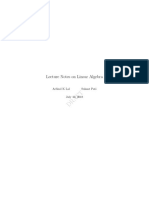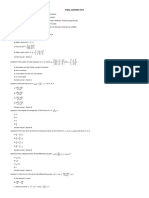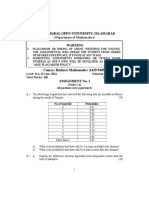C3 Solomon G
C3 Solomon G
Uploaded by
Josh ZngrCopyright:
Available Formats
C3 Solomon G
C3 Solomon G
Uploaded by
Josh ZngrOriginal Description:
Copyright
Available Formats
Share this document
Did you find this document useful?
Is this content inappropriate?
Copyright:
Available Formats
C3 Solomon G
C3 Solomon G
Uploaded by
Josh ZngrCopyright:
Available Formats
FOR EDEXCEL
GCE Examinations Advanced Subsidiary
Core Mathematics C3
Paper G Time: 1 hour 30 minutes
Instructions and Information
Candidates may use any calculator EXCEPT those with the facility for symbolic algebra, differentiation and / or integration. Full marks may be obtained for answers to ALL questions. Mathematical formulae and statistical tables are available. This paper has seven questions.
Advice to Candidates
You must show sufficient working to make your methods clear to an examiner. Answers without working may gain no credit.
Written by Shaun Armstrong
Solomon Press These sheets may be copied for use solely by the purchasers institute.
Leave blank
1.
A curve has the equation y = (3x 5)3. (a) Find an equation for the tangent to the curve at the point P (2, 1). (4)
The tangent to the curve at the point Q is parallel to the tangent at P. (b) Find the coordinates of Q. (3)
Solomon Press
C3G page 2
Leave blank
2.
(a)
Use the identities for cos (A + B) and cos (A B) to prove that 2 cos A cos B cos (A + B) + cos (A B). (2)
(b)
Hence, or otherwise, find in terms of the solutions of the equation 2 cos (x + ) = sec (x + ),
2 6
for x in the interval 0 x .
(7)
Solomon Press
C3G page 3
Turn over
Leave blank
3.
Differentiate each of the following with respect to x and simplify your answers. (a) (b) (c) ln (cos x) x2 sin 3x 6 2x 7 (3) (3) (4)
Solomon Press
C3G page 4
Leave blank
3.
continued
Solomon Press
C3G page 5
Turn over
Leave blank
4.
(a) (b)
Express 2 sin x 3 cos x in the form R sin (x ) where R > 0 and 0 < < 90. Show that the equation cosec x + 3 cot x = 2 can be written in the form 2 sin x 3 cos x = 1.
(4)
(1)
(c)
Solve the equation cosec x + 3 cot x = 2, for x in the interval 0 x 360, giving your answers to 1 decimal place. (5)
Solomon Press
C3G page 6
Leave blank
4.
continued
Solomon Press
C3G page 7
Turn over
Leave blank
5.
(a) (b)
Show that (2x + 3) is a factor of (2x3 x2 + 4x + 15). Hence, simplify
(2)
2 x2 + x 3 . 2 x3 x 2 + 4 x + 15 (c) Find the coordinates of the stationary points of the curve with equation y= 2 x2 + x 3 . 2 x3 x 2 + 4 x + 15
(4)
(6)
Solomon Press
C3G page 8
Leave blank
5.
continued
Solomon Press
C3G page 9
Turn over
6.
The population in thousands, P, of a town at time t years after 1st January 1980 is modelled by the formula P = 30 + 50e0.002t. Use this model to estimate (a) (b) the population of the town on 1st January 2010, the year in which the population first exceeds 84 000.
(2) (4)
Leave blank
The population in thousands, Q, of another town is modelled by the formula Q = 26 + 50e0.003t. (c) Show that the value of t when P = Q is a solution of the equation t = 1000 ln (1 + 0.08e0.002t). (d) Use the iteration formula tn + 1 = 1000 ln (1 + 0.08e 0.002tn ) with t0 = 50 to find t1, t2 and t3 and hence, the year in which the populations of these two towns will be equal according to these models.
(4) (3)
Solomon Press
C3G page 10
Leave blank
6.
continued
Solomon Press
C3G page 11
Turn over
Leave blank
7.
y = f(x) (a, 0) (0, b)
Figure 1
Figure 1 shows the graph of y = f(x) which meets the coordinate axes at the points (a, 0) and (0, b), where a and b are constants. (a) Showing, in terms of a and b, the coordinates of any points of intersection with the axes, sketch on separate diagrams in the spaces provided the graphs of (i) (ii) Given that f(x) = 2 (b) (c) find the values of a and b, find an expression for f 1(x) and state its domain. x + 9 , x , x 9,
(3) (5)
y = f 1(x), y = 2f(3x).
(6)
Solomon Press
C3G page 12
Leave blank
7.
continued
Solomon Press
C3G page 13
Turn over
Leave blank
7.
continued
END
Solomon Press
C3G page 14
You might also like
- ATI TEAS Calculation Workbook: 300 Questions to Prepare for the TEAS (2024 Edition)From EverandATI TEAS Calculation Workbook: 300 Questions to Prepare for the TEAS (2024 Edition)No ratings yet
- Add Maths SPM Forecast PapersDocument16 pagesAdd Maths SPM Forecast PapersShanmuganantha KathiraveluNo ratings yet
- Core Mathematics C3: GCE Examinations Advanced SubsidiaryDocument4 pagesCore Mathematics C3: GCE Examinations Advanced SubsidiaryJosh ZngrNo ratings yet
- Core Mathematics C3: GCE Examinations Advanced SubsidiaryDocument4 pagesCore Mathematics C3: GCE Examinations Advanced Subsidiarydasha962No ratings yet
- Solomon EDocument4 pagesSolomon ELeen JabbanNo ratings yet
- Solomon Press C2ADocument18 pagesSolomon Press C2AnmanNo ratings yet
- C3 Solomon ADocument16 pagesC3 Solomon AJosh ZngrNo ratings yet
- Core Mathematics C3: GCE Examinations Advanced SubsidiaryDocument4 pagesCore Mathematics C3: GCE Examinations Advanced SubsidiaryClaire HarnettNo ratings yet
- 4PM0 01 Que 20130117 PDFDocument8 pages4PM0 01 Que 20130117 PDFDimuthu SandaruwanNo ratings yet
- Solomon Press C2CDocument18 pagesSolomon Press C2CnmanNo ratings yet
- c3-c4 Specimen PaperDocument10 pagesc3-c4 Specimen Papersalak946290No ratings yet
- Edexcel GCE: Core Mathematics C1 Advanced Subsidiary Mock PaperDocument18 pagesEdexcel GCE: Core Mathematics C1 Advanced Subsidiary Mock PaperAdrianaBeck0% (1)
- End of Year Test 2008Document4 pagesEnd of Year Test 2008Bernice JohnsonNo ratings yet
- Solomon Press C2LDocument18 pagesSolomon Press C2LnmanNo ratings yet
- Solomon Press C2FDocument18 pagesSolomon Press C2FnmanNo ratings yet
- C3 Practice Paper A5Document5 pagesC3 Practice Paper A5Hannah Mohy-EldinNo ratings yet
- C3 June 2014Document6 pagesC3 June 2014Kareem MohamedNo ratings yet
- Combined QP (Reduced) - C1 EdexcelDocument60 pagesCombined QP (Reduced) - C1 EdexcelkhbfjkajfbkadahdsaNo ratings yet
- C1 Mock Paper Exam PaperDocument22 pagesC1 Mock Paper Exam PaperNesreen Kamel Al-SayeedNo ratings yet
- Solomon ADocument4 pagesSolomon Asalak946290No ratings yet
- Core Mathematics C2: GCE Examinations Advanced SubsidiaryDocument4 pagesCore Mathematics C2: GCE Examinations Advanced SubsidiaryChutney123213No ratings yet
- Elmwood Press C1 Paper ADocument4 pagesElmwood Press C1 Paper Aiabdi1No ratings yet
- C4 by TopicDocument72 pagesC4 by TopicWojtek BażantNo ratings yet
- June 1988 - June 1997 Maths Paper 2Document38 pagesJune 1988 - June 1997 Maths Paper 2Jerilee SoCute Watts0% (1)
- Solomon FDocument4 pagesSolomon FLeen JabbanNo ratings yet
- 2009 June C3Document6 pages2009 June C3POk TAngNo ratings yet
- 9801 01 Que 20100630Document8 pages9801 01 Que 20100630SCZ28No ratings yet
- Core Mathematics C3: GCE Examinations Advanced SubsidiaryDocument4 pagesCore Mathematics C3: GCE Examinations Advanced Subsidiarydasha962No ratings yet
- Additional Mathematics 2003 November Paper 1Document8 pagesAdditional Mathematics 2003 November Paper 1lornarifaNo ratings yet
- C4 Bronze 4Document18 pagesC4 Bronze 4Betty MakharinskyNo ratings yet
- Acjc h2 Maths p1 QN PaperDocument6 pagesAcjc h2 Maths p1 QN Papervincesee85No ratings yet
- Paper B - QP C3 SolomonDocument14 pagesPaper B - QP C3 SolomonwelcomehorseNo ratings yet
- Core Mathematics C3 For Edexcel Advanced Level: Paper K Time: 1 Hour 30 MinutesDocument4 pagesCore Mathematics C3 For Edexcel Advanced Level: Paper K Time: 1 Hour 30 MinutesNashra19No ratings yet
- Core Mathematics C2: GCE Examinations Advanced SubsidiaryDocument18 pagesCore Mathematics C2: GCE Examinations Advanced SubsidiaryhellooceanNo ratings yet
- Core Mathematics C3: GCE Examinations Advanced SubsidiaryDocument4 pagesCore Mathematics C3: GCE Examinations Advanced Subsidiarydasha962No ratings yet
- Elmwood K PDFDocument4 pagesElmwood K PDFPa GesNo ratings yet
- Additional Mathematics 2002 November Paper 1Document8 pagesAdditional Mathematics 2002 November Paper 1lornarifaNo ratings yet
- 2011 Mock Paper BythemathscafeDocument6 pages2011 Mock Paper BythemathscafefardeenNo ratings yet
- Solomon Press C2EDocument18 pagesSolomon Press C2EnmanNo ratings yet
- Elmwood J PDFDocument4 pagesElmwood J PDFPa GesNo ratings yet
- 11-Maths-B2-Annual Exam 2023-24Document5 pages11-Maths-B2-Annual Exam 2023-24Arunava DuttaNo ratings yet
- Assignment For Science Class 10Document9 pagesAssignment For Science Class 10Palvi DeviNo ratings yet
- Core Mathematics C3 For Edexcel Advanced Level: Paper J Time: 1 Hour 30 MinutesDocument4 pagesCore Mathematics C3 For Edexcel Advanced Level: Paper J Time: 1 Hour 30 MinutesNashra19No ratings yet
- 2009 NYJC H2 Maths PromoDocument6 pages2009 NYJC H2 Maths PromoSapphireansNo ratings yet
- Edexcel C2 May 2015Document6 pagesEdexcel C2 May 2015Andrew WongNo ratings yet
- Edexcel GCE: 6665/01 Core Mathematics C3 Gold Level (Hard) G1Document13 pagesEdexcel GCE: 6665/01 Core Mathematics C3 Gold Level (Hard) G1Ryantyler13No ratings yet
- 12 Gold 4 - C2 Edexcel PDFDocument17 pages12 Gold 4 - C2 Edexcel PDFNicholas TehNo ratings yet
- Analytic Geometry: Graphic Solutions Using Matlab LanguageFrom EverandAnalytic Geometry: Graphic Solutions Using Matlab LanguageNo ratings yet
- Trigonometric Ratios to Transformations (Trigonometry) Mathematics E-Book For Public ExamsFrom EverandTrigonometric Ratios to Transformations (Trigonometry) Mathematics E-Book For Public ExamsRating: 5 out of 5 stars5/5 (1)
- De Moiver's Theorem (Trigonometry) Mathematics Question BankFrom EverandDe Moiver's Theorem (Trigonometry) Mathematics Question BankNo ratings yet
- Log-Linear Models, Extensions, and ApplicationsFrom EverandLog-Linear Models, Extensions, and ApplicationsAleksandr AravkinNo ratings yet
- Transformation of Axes (Geometry) Mathematics Question BankFrom EverandTransformation of Axes (Geometry) Mathematics Question BankRating: 3 out of 5 stars3/5 (1)
- 11.3 Eigenvalues and Eigenvectors of A Tridiagonal MatrixDocument7 pages11.3 Eigenvalues and Eigenvectors of A Tridiagonal MatrixVinay GuptaNo ratings yet
- PHYS 419: Classical Mechanics Lecture Notes: I. Work and EnergyDocument8 pagesPHYS 419: Classical Mechanics Lecture Notes: I. Work and EnergySanu Kaji MaharjanNo ratings yet
- Linear Algebra With ArmadilloDocument68 pagesLinear Algebra With Armadilloapi-230248426No ratings yet
- Wazwaz IEch 3 S 2 S 3 P 9Document1 pageWazwaz IEch 3 S 2 S 3 P 9honey fatimaNo ratings yet
- Multivariable CalculusDocument168 pagesMultivariable CalculusPatrick Hofbauer100% (3)
- La PDFDocument208 pagesLa PDFDurga 333No ratings yet
- Set-Builder Notation: Type of NumberDocument5 pagesSet-Builder Notation: Type of NumberMichelleneChenTadleNo ratings yet
- Maths Quiz Questions With AnswersDocument9 pagesMaths Quiz Questions With AnswersShiela Mae GatchalianNo ratings yet
- N R References: 104.32 The Riemann Zeta Function As A Sum of Geometric SeriesDocument4 pagesN R References: 104.32 The Riemann Zeta Function As A Sum of Geometric SeriesEsteban GadaczNo ratings yet
- Quadratic Function and Factoring Quadractic EquationDocument14 pagesQuadratic Function and Factoring Quadractic EquationYvan OmayanNo ratings yet
- MTH 111 Algebra and Trigonometry Lecture Notes 20182019Document46 pagesMTH 111 Algebra and Trigonometry Lecture Notes 20182019Faruk AdemoyeNo ratings yet
- Drawing Curves Automatically: Procedures As Arguments: Curveto Lineto Stroke Fill ClipDocument9 pagesDrawing Curves Automatically: Procedures As Arguments: Curveto Lineto Stroke Fill CliplaoraculoNo ratings yet
- Com Alg 7Document8 pagesCom Alg 7Aasif DarNo ratings yet
- Year 11-Addmaths-Paper 1-Trial2Document13 pagesYear 11-Addmaths-Paper 1-Trial2Ivan TanNo ratings yet
- 2020 2 UlanganDocument2 pages2020 2 Ulangang-84323913No ratings yet
- Digital Control April 2018Document4 pagesDigital Control April 2018Mourougapragash SubramanianNo ratings yet
- Final Answer Key Asst Profesor Chemical EngineeringDocument14 pagesFinal Answer Key Asst Profesor Chemical EngineeringA SrikrishnanNo ratings yet
- Differnce Quotients WorksheetDocument5 pagesDiffernce Quotients WorksheetKhoo Wei QuanNo ratings yet
- Survey On Lie Group Machine LearningDocument24 pagesSurvey On Lie Group Machine LearningLucas FiordelisiNo ratings yet
- Maths Syllabus: Topic Objectives Mental ArithmeticDocument2 pagesMaths Syllabus: Topic Objectives Mental ArithmeticAisha SaNo ratings yet
- Fracciones Parciales - StewartDocument10 pagesFracciones Parciales - StewartDaniel CastellamosNo ratings yet
- Institute For Ias/Ifos Examinations: Partial Differential EquationsDocument23 pagesInstitute For Ias/Ifos Examinations: Partial Differential EquationsAmeya KaleNo ratings yet
- Calculus For Everyone-18-02-09Document131 pagesCalculus For Everyone-18-02-09diekoNo ratings yet
- P.6 Math Lesson Notes Term 1-3Document127 pagesP.6 Math Lesson Notes Term 1-3TUMUSIIME INNOCENTNo ratings yet
- Spherical Trigonometry Law of Cosines TrigonometryDocument3 pagesSpherical Trigonometry Law of Cosines TrigonometryFaisal SaleemNo ratings yet
- N N N N Y: Signals & Systems Questions Set 01Document13 pagesN N N N Y: Signals & Systems Questions Set 01Sachin Singh NegiNo ratings yet
- MTH401 Subjective Solved Mid Term Past PaperDocument27 pagesMTH401 Subjective Solved Mid Term Past PaperChugtahi100% (1)
- STEP 2 2019 Report, Hints, Mark SchemeDocument46 pagesSTEP 2 2019 Report, Hints, Mark SchemeJesse Drake100% (1)
- Line Intregal (Riley, Hobson and Bence)Document13 pagesLine Intregal (Riley, Hobson and Bence)Naimur RahmanNo ratings yet
- 1429 Business Math B Com AiouDocument3 pages1429 Business Math B Com AiouMuhammad Salim Ullah Khan50% (4)

